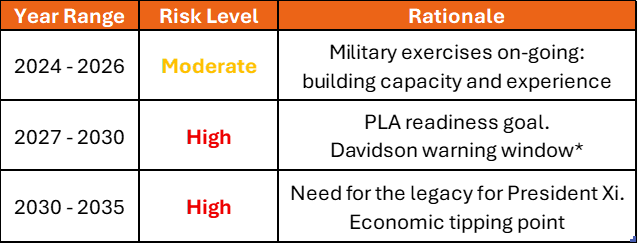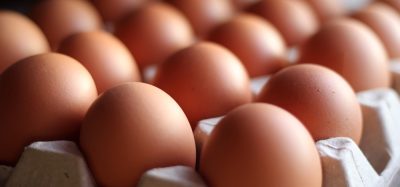China-Taiwan conflict: prepare for a tectonic shock to the global food system
Posted: 15 July 2025 | Professor Chris Elliott | No comments yet
Professor Chris Elliott warns that the looming China–Taiwan conflict could have a seismic impact on global food security – from blocked trade routes and fertiliser shortages to serving as a wake-up call for UK national food resilience.


Imagine waking one morning to the news that Russia had launched a full-scale invasion of Ukraine? We all did. Now, imagine waking one morning to the news that China has launched an invasion of Taiwan? We likely all will.
In many commentators’ views, it’s a case of when, not if, some form of direct action will happen.”
In many commentators’ views, it’s a case of when, not if, some form of direct action will happen. This may be limited to a blockade initially or increase in scale to a full-scale invasion. The Center for Strategic and International Studies (CSIS) survey of experts found that around 77 percent of them believe either a blockade or invasion is ‘likely’ or ‘very likely’ to occur, but also a range of other threatening moves could be made, as shown in Figure 1.


Figure 1. Estimated likelihood of Chinese action towards Taiwan based on expert opinions
As to when this may happen, there appears to be a range of important factors: the military capacities of China, which are growing rapidly; completion of the stated mission by President Xi before he steps down from power and how the United States, especially President Trump, would respond. A summary of risk levels over time from a wide range of sources is listed in Table 1.
From this, the next few years are clearly considered high risk. The PLA readiness goal mentioned refers to the People’s Liberation Army of China being fully prepared militarily, logistically and technologically for a potential invasion or blockade of Taiwan by a specific date. In recent intelligence assessments, that target year is 2027, just two years away and when Trump will still be in power. Will China see this as a threat or an opportunity? His wild unpredictability would be a concern, but his ‘America First’ policy, his weakening of NATO and his multiple trade disputes with many other countries are likely to be viewed far more within the opportunity bracket.


Table 1: Risks levels of a China invasion of Taiwan over the next decade
*The “Davidson warning window” refers to a strategic warning timeline first articulated by Admiral Philip S Davidson, the former commander of US Indo‑Pacific Command, during his 9 March 2021 Senate testimony.
If/when the invasion does happen, there will of course be huge repercussions, including the possibility of other countries being drawn into the conflict to an extent that it would become the most dangerous in terms of global escalation since World War II. With Taiwan producing over 60 percent of the world’s semiconductors and over 90 percent of the most advanced chips, a conflict would likely cripple a plethora of technology-dependent industries: from computers to smartphones and equally important, cars.
It is little wonder that the US is racing to become self-sufficient in semiconductor production, but this will take to at least the end of this decade, and the rest of the world will still be dependent on what could be sourced from Taiwan. Excuse my pun but…this would give China the bargaining chip of all chips. And many other forms of international trade disruptions would occur. In fact, the former UK foreign secretary James Cleverly, warned world trade would be destroyed.
The question must be asked: now that the UK is preparing for war, what steps is the government taking in terms of food security within the national security agenda?”
While many aspects of a potential invasion have been explored by a range of extremely reputable organisations, one of the most important seems to have been much less extensively examined: the impact on global food security. I have tried to select a number of critical areas that would have the most profound impacts to attempt to show the scale of what the world might be facing.
The first and probably most important impact would be on the transportation of vital food commodities. The Taiwan Strait handles over $2.45 trillion in shipping annually. To put this into some perspective, this is more than 20 percent of the total of maritime trade globally and includes vast amounts of cereals and edible oils. Any blockade of this waterway would trigger large price hikes in these commodities very quickly, as the futures market would respond virtually immediately. This is likely to be followed by huge pressures on the prices of milk and meat, as ‘just in time’ supply chains of animal feed will be badly disrupted.
But it’s not just foods of animal origin that will be challenged. China plays a massive role in global fertiliser production, especially through the exportation of two key ingredients: phosphates and urea. China is the largest single exporter of both globally, accounting for around one third and 15 percent respectively of all exports. Shortages of supply will have major impacts globally on crop yields, food prices and availability. In the medium to long-term, the difficulties would be intensified by the lack of vital agritech components that China supplies to the world.
The scale of disruption is potentially immense, impacting the lives of virtually everyone on the planet, but as with all catastrophes, the most affected will be the poorest countries and the poorest citizens within them. Put simply, the world order in terms of food security would change, new alliances would be struck up, and this begs the question: how long has the planning for a potential invasion been going on in terms of food security? In an article I wrote nearly two years ago, I outlined some of the very big drivers for change that I could see happening. The formation and expansion of BRICS+ was one of these.
The question must be asked: now that the UK is preparing for war, what steps is the government taking in terms of food security within the national security agenda? The 2024 DEFRA Food Security Report, to my mind, is very much ‘the glass is half full’, and while outlining some of the major gaps the UK has in terms of future food resilience, it does not have an action plan as such but rather points out a number of key areas for improvement and encourages a few interventions that should be driven by industry and government. The irony of course is that DEFRA is the part of government that should be producing an action plan….
So rather than waiting for DEFRA or should I say waiting for Godot (a phrase that refers to a state of endless, often futile, waiting for something or someone that may never arrive or happen….), I’ve prepared the outline of a plan (Table 2). This is a combination of thoughts/ideas/recommendations from various sources. While this very much has the looming China-Taiwan crisis in mind, it really is a plan to mitigate the nation to the many looming shocks we face over a relatively short time period. As my close friend Dr Clive Black has written, the starting point for this must be the disbandment of DEFRA and the appointment of a Secretary of State for Food Security. Why? Because in my final table the need for a functioning food resilience plan relies too heavily on a government department where the D stands for dysfunctional.
In the words of Theodore Roosevelt: ‘In any moment of decision, the best thing you can do is the right thing, the next best thing is the wrong thing, and the worst thing you can do is nothing’. By way of this article, I challenge the current UK government to respond to another massive national security gap and hopefully not by doing nothing.


Table 2: Proposed Action Plan for the UK Government to mitigate against the impacts of an invasion of Taiwan on UK national food security
Related topics
Food Safety, Food Security, Supply chain, Trade & Economy, World Food









